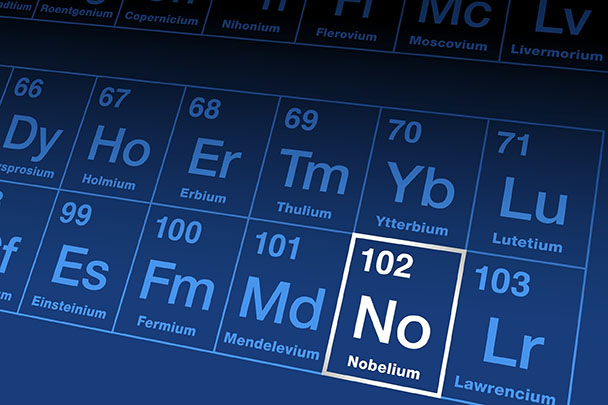

Nobelium is a synthetic chemical element with the symbol No and atomic number 102. It is the second-heaviest element that has been created in a laboratory. Nobelium was first created in 1957 by a team of scientists at the Joint Institute for Nuclear Research in Dubna, Russia.
Nobelium is a very unstable element with a half-life of just 58 seconds. This means that it decays into other elements very quickly. Nobelium is also very radioactive, meaning that it emits harmful particles.
Nobelium has not yet been found in nature. It is thought to be produced in very small amounts in the supernova explosions of very massive stars.
The name "nobelium" was chosen to honour Alfred Nobel, the Swedish chemist and engineer who invented dynamite. The name was chosen to honour Nobel's contributions to science.
Nobelium has no known uses. It is too unstable and radioactive to be used for anything practical. However, scientists continue to study nobelium in the hope of learning more about its properties and behaviour.
Nobelium is a synthetic element, which means that it does not occur naturally on Earth.

The word "nobelium" has no other forms. It is a proper noun, which means that it is the name of a specific element.
The word "nobelium" comes from the name of Alfred Nobel, the Swedish chemist and inventor who founded the Nobel Prizes. Nobelium was named in his honor after his death in 1918.
The word "nobelium" was first used in 1957 by a team of scientists at the Nobel Institute in Stockholm, Sweden. The team had discovered a new element, and they named it nobelium in honor of Alfred Nobel.
What is nobelium?
Question:
Describe the element nobelium and its significance in the field of science.
Answer:
Nobelium is a synthetic chemical element with the symbol No and atomic number 102. It belongs to the actinide series and is part of the transuranium elements, which means it is artificially created through nuclear reactions. Nobelium was first synthesised in 1958 by a team of scientists led by Albert Ghiorso.
Due to its high atomic number and instability, nobelium has limited practical applications. It is primarily used for research purposes, particularly in nuclear physics and the study of heavy elements. It's short half-life and radioactive nature make it challenging to work with, but researchers have been able to gain valuable insights into the nuclear structure and properties through experiments involving nobelium.
The naming of nobelium is significant as it honours Alfred Nobel, the inventor of dynamite and the founder of the Nobel Prizes. This connection underscores the element's importance in advancing scientific knowledge and highlights the ongoing exploration of the periodic table's heavier elements.
Address
Developing Experts Limited
Exchange Street Buildings
35-37 Exchange Street
Norwich
NR2 1DP
UK
Phone
01603 273515
Email
hello@developingexperts.com
Copyright 2025 Developing Experts, All rights reserved.